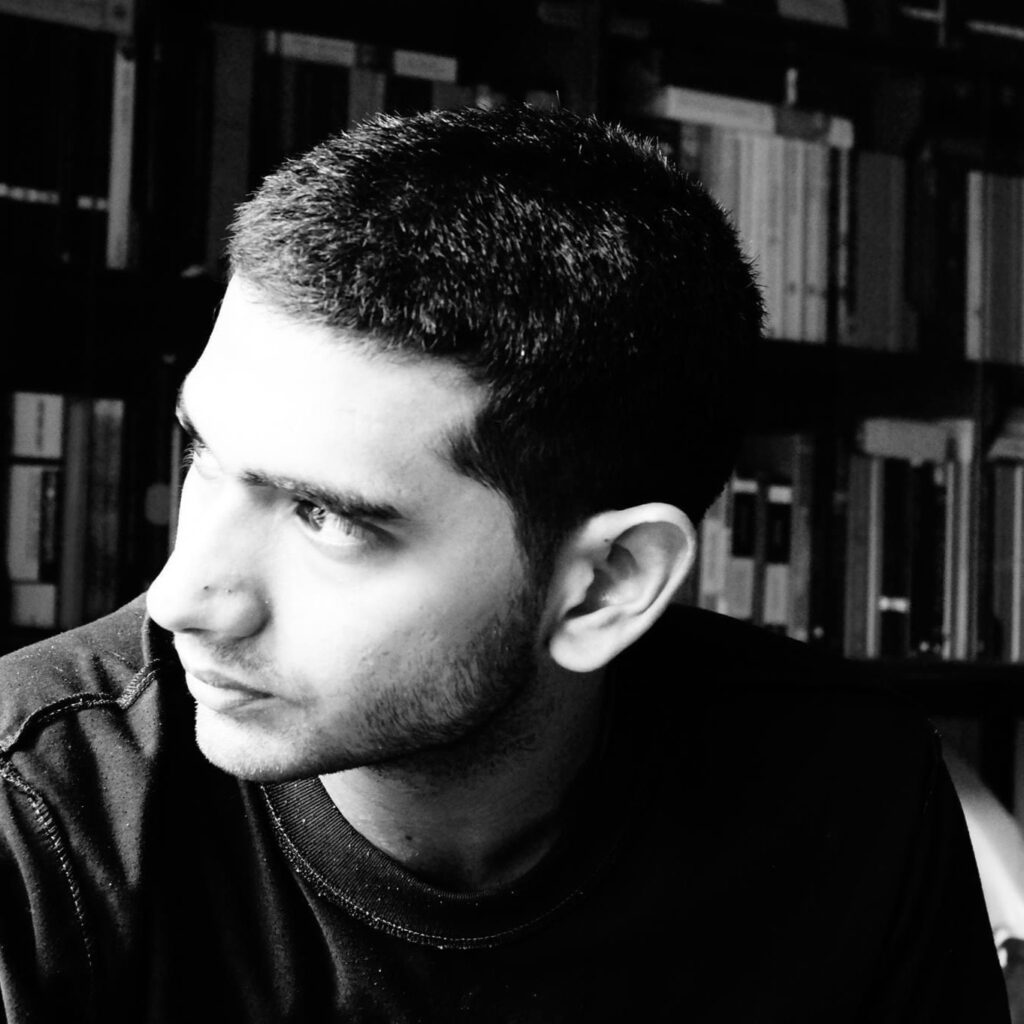Sourav Chatterjee
I
When you linger too long in the darkness, it becomes light. Some said Suja’s son, Bulu, went crazy at the age of thirty-two. The symptoms were showing, but Suja never believed them. With his thirty million degrees—first in commerce, then in anthropology, psychology, and other redundant branches of knowledge—Bulu could not find a job in the city. Calcutta was always cruel to mediocre people, he thought, but then he would survive. He would live a lavish life with a well-paid job as a college professor. He would have a proper apartment with two bathrooms, a personal library, and a grey cat. He fabricated more dreams around the imaginary cat than he did around his profession or the hordes of unread books scattered in the bedroom.
Cats were always good for social media engagement. A photo of a cat next to a book, a teacup, a pillow, or on the window drew viewers like moths. But before that, he needed a new phone. He was tired of flashing his cheap Chinese phone with eighteen cameras to strangers on the metro. He needed a new phone, and for that, he needed a job.
Suja was proud of her son. After the death of her husband, she raised Bulu on the income of one. The same old story about an absent father, a struggling mother, and a brilliant son born for greatness among paupers.
Suja worked in a local hosiery store in the city. It had a funny name: ‘The New Young Bengal Hosiery Emporium.’ The store sold everything from nylon socks to bras, panties, vests, underwear, trousers, and belts. Bulu was often embarrassed by his friends, who called him the ‘panty-sellers’ son’. But it was also one of those hosiery stores that fell out of fashion due to the lack of a ‘fitting room.’
A passerby’s glimpse would reveal the dimly lit store to be always empty, with a ‘helper’ sitting behind the counter under a slow-spinning ceiling fan reading a newspaper or scrolling mindlessly through WhatsApp chats. Suja was such a figure—a ‘helper’ managing the store for the last thirty-seven years. It wasn’t a miserable life, but she knew her son would bring something more into their life—an air conditioner (the summer heat was becoming unbearable), a microwave (she was tired of re-boiling her cold tea), and a new phone (her phone hanged too much). She knew her son would sustain her, look after her, look after the family, and once he started working, who knew, maybe she could marry him off to a nice Bengali girl. But they all must live in the same house; they cannot live separately; she wouldn’t allow that. She had nobody in her life except her son, a ‘piece of diamond,’ who was tall and skinny with a head full of hair, unlike her husband.
Tall people run this world. Suja thought they had a future and a sense of leadership. They are the only ones who should matter. They looked stately, respectable, and stood out in a crowd. They had pride. Yes, the pride that built the Great Pyramids of Egypt, that pride! Tall people are celebrated in poetry, art, literature, and history throughout the world, whereas short people like Suja’s husband had only self-pity, consolations, compromises, and compensation because they could never matter in the grand scheme of things. Tagore was tall enough to win the Nobel Prize and Ray the Oscar.
Suja knew that in the city, women preferred not to settle down with short people since tall men worked magic on the physical disposition of the future generation. Unlike short people, tall people were born with a sense of an extension of their selves. They extended into the world and into generations to come. Tall people were friends with other tall people. Height was everything in the city, an alternate category of arrogance and discrimination. The stars would align for a tall man in the city. And if she followed these omens, everything pointed to success, fame, and respect in her son’s life.
For most of her life, she daydreamed about her son, and living was merely an interruption of daydreaming.
Had school education not been mandatory, Bulu would have skipped school altogether—a defunct system run by those who underwent a knowledge retirement as soon as they were employed, those who never went back home and sought to educate themselves. After all, why would they? They were not scholars, they did it for their monthly paycheck. They had a life, wife, husband, children, pets, enough tobacco, everyday toxic soaps and serials, and endless cricket matches to return to at the end of the day. Therefore, Bulu thought their class lectures were no worse than the mephitic fumes emitted from the tannery behind the school. Teachers were a joke in the city. They were regressive, prude, and conservative.
Bulu thought he was too qualified for a job as a schoolteacher as he had to be paid more than the other lowlife sadists who had a degree in Education who thought they possessed the skills to forge the spirit of the new generation. Reputed schools in the city—Harvard High, Cambridge High, Oxford Day, and Yale Metropolitan—were cautious not to create an imbalance in the power structure by recruiting someone who would silently judge their abilities. They would never hire an overqualified candidate.
The Communist idea that educators must first be educated melted away into the polluted air of the city. What if Bulu introduced students to the ideals of the Communist Party or Student Federation? What if he brainwashed them into believing India was not a Hindu country or a democracy anymore? What if he made students believe that his lectures were the only thing that mattered: the rest was garbage, pure, unfiltered, unadulterated garbage? What if he turned students into atheists or revolutionaries? Some fears were just more irrational. Fears made soothsayers of them all.
Bulu was not insensitive; he always had enough sympathy for those who became schoolteachers. He thought of them as the worst and most dangerous lot of the population who assumed the responsibility to mold the minds of the next generation without restraint, daily exercising enough violence to maniacally iron out students’ shortcomings with wooden canes. Within this toxic wasteland, there was always a handful of quiet, unappreciated, and unpopular teachers who silently produced true intellectuals every decade!
The only teacher Bulu remembered from school was his math teacher—a bank teller in her former life who taught high school calculus and integration. Every time Bulu failed his math exam, his teacher would pat his shoulders and softly murmur, “It’s okay, it’s okay, it’s okay. It doesn’t matter; it’s okay!”
Bulu went to her cremation when she died after her retirement. Bulu didn’t see her former colleagues or students from the school. Bulu heard she lived a pathetic life on her meager pension and late interests from fixed deposits. After her retirement, she spent most of her days tracking shares on the stock market—for hair oils, bicycles, cement, safety pins, and transistors—that fluctuated daily. Her son was settled in New Jersey, happily married, and already with a Green Card. He couldn’t come for the last rites. It was the end of the fiscal year. Can’t have everything. Everyone is checked by the limits of the possible!
II
The talk of students losing curiosity to read their own literature and speak their mother tongue transformed English-medium schools in the city into a place of enforced discipline, corporal punishment, and inhuman rigorous education. The Founding Fathers of the school knew well to select random Roman sayings from Virgil, Pliny, Cicero, and Seneca as mottos to delude students into believing that receiving an education there was no different from crossing the Alps!
The school prioritized the Sciences over Commerce and Commerce over the Arts. The battle of the disciplines was real, as real as the Crusades. Geniuses studied Science, the corrupt studied Commerce, and the defunct studied Arts. That was the anthem of the city.
Nothing made sense in the city anymore. Education was a farce because it was hierarchical; it polarized students and forged alliances based on a future that was still unwritten. Even the school football team was divided into a Muslim wing and a Hindu wing; the Christians were absorbed into the Hindu wing. The Principal said this communal football during the lunch break had something to do with Hindus aligning with Christians during the Revolt of 1857 and the Partition. The school was not to be blamed for the history of the country.
Bulu studied Arts in high school. He was stigmatized not only by those who taught literature but also by those who kept asking him, “Why did you choose Arts?” “Are your parents too rich?” “Who will marry you?” “Who will give you a job?” “This is a woman’s subject; you do understand that, huh?” This barrage of humiliation was compounded by the glaring looks of teachers who considered Bulu to be a sub-human. Not only he but all Arts students (unless they were filthy rich) were aberrant in the school. They had their lunch in the classroom.
During the lunch break, the Science students mingled with the Commerce folks in the canteen! The Commerce students never fought the Science students because they knew they would be the ones to earn millions in the next five years in big firms and multinational corporations! They learned early to identify influential students who would eventually matter, inherit wealth, and come into a legacy! One had to inculcate identifying bodies laden with power. It was an essential skill for survival.
Meanwhile, the Arts students sat silently in the corner of an empty classroom and talked among themselves about pursuing Management in college while memorizing Walter de la Mare’s The Listeners for the exam after the break— “Is there anybody there? said the Traveller,/ Knocking on the moonlit door…”
The Science students thought studying Arts meant doing arts and crafts—a lifelong dedication to origami and wrapping gifts or something like that. But the ‘arts and crafts’-students handled scissors and tapes better than anyone else, something that all the factions of the upper echelon unanimously agreed upon.
Hell had never spat forth such privileged offals from its bowels before. Bulu never forgot that smug look in the eyes of the Science students when he brushed past them in the corridors during the tiffin break. They coughed up blobs of green mucus and spat on Bulu’s newly polished boots. The event never failed to trigger a raucous outburst of unbearable laughter from the Science boys. Teachers would never interfere in such trifles. The occasional bullying made Bulu so nauseated that he would rush to the bathroom to vomit his morning meal—the yellow rice and lentils—his mother prepared with so much love before leaving for her daily ten-hour shift at the hosiery store!
“Look at this weakling! Hahaha!” The Science boys boisterously enjoyed the scene of Bulu’s incessant puking!
Secret cabals of horny brotherhood whispered to each other their plans to establish a new world order between the change of classes, in empty corridors, in the silence of the library, and through the gaps between the toilet stalls. The cabals passed around chits of paper during lectures. The final receiver either swallowed the chit or threw it out of the window, removing all traces of conspiracy. The teachers never interfered.
A vile system built to exclude and discriminate on the grounds of disciplinary training had no place for Bulu—a below-average student in school and doubly emasculated, firstly, for not being good at math—the manliest subject par excellence since the time of Plato—secondly, for daring to study a ‘woman’s subject,’ LITERATURE! He became a social pariah, an effete, an ostracized piece of junk!
After his doctorate degree, he was out of a job for six years. He applied to more than seven hundred jobs and was rejected by everyone. People consoled him by blaming the rising population of the country, the job saturation in the city, the recession, the defunding of research institutes by the Right Wing, identitarianism, and caste discrimination in admission processes.
This was his last job interview at a local school, where he was forced to apply out of desperation. So what? He was still proud and tall, or so his mother thought.
At the interview, the members of the selection committee asked for the transcripts of Bulu’s High School exams.
“What can you teach?” asked the Principal.
“Anything written in English,” replied Bulu.
“No, we mean subject-wise,” clarified the Principal.
“English, Political Science, Geography, History, and Economics,” clarified Bulu.
“Actually, we are looking for a teacher with slightly better grades in the High School Board exams,” replied the Principal.
“I have a Ph.D. in English,” Bulu reminded the board.
“But you haven’t scored ninety percent in any of the high school subjects. Oh yes, I see you got ninety-seven in Environmental Studies, but what’ll we do with that? Tell us. We don’t see a ninety in English on your transcripts.” Could this really be the school Principal? Bulu thought he sounded more like a fish seller in the river market.
“I have three degrees in English.” A hint of condescension was evident in Bulu’s response.
“Well, Mr. B, that doesn’t mean anything. You will still be teaching school students and not college students, and we are trying to set an example by setting the highest.” Bulu was zoning out every time the Principal opened his mouth. Same old banal questions, same old facile causalities. Bulu knew where this was going. He stopped responding. He took his file and left the room.
***
Suja offered a coconut at the local Kali temple on the morning of this last interview. She had faith that this time, Bulu would get the job at the school. She was already feeling proud. She would come back home to celebrate with her son. They would order the egg-chicken roll from the local tandoor stall. She would distribute sweets among her colleagues at the store to celebrate Bulu’s new job. But little did she know that in the evening, she would return home to find a body hanging from the ceiling fan. Tall, lanky, beautiful, proud, with a head full of hair.
The cursor on Bulu’s computer would stand idly at the end of an incomplete sentence. He refused to endow the sentence with a purpose, so he simply abandoned it. It read:
“To the Members of the Selection Committee, Cambridge High School—
Kolkata, 7675—
Dear Members of the Search Committee:
I am writing with great enthusiasm to apply for the position of |”

Sourav is an Early Career Postdoctoral Fellow and Lecturer in the Department of Middle Eastern, South Asian, and African Studies at Columbia University. He got his PhD in South Asian Studies and Comparative Literature from Columbia University. His research interests are South Asian literature, Global Anglophone literature, visual cultures, and literary criticism. His research has been published in Victorian Periodicals Review, Victorian Studies, and South Asian Studies. On Instagram, he runs The Antilibrarian Project, where he writes public-facing book reviews. He is currently working on his first novel, Kolkolabi, a story of three generations based in post-Independence Calcutta. Twitter/X: @sourav_cat; Instagram: @antilibrarian
Featured photo by Rahul Pandit (Pexels)





